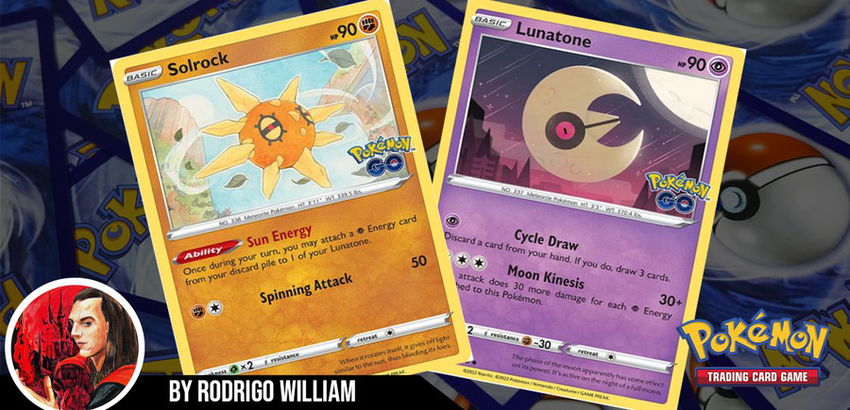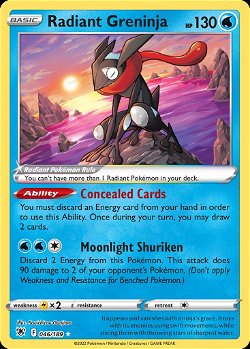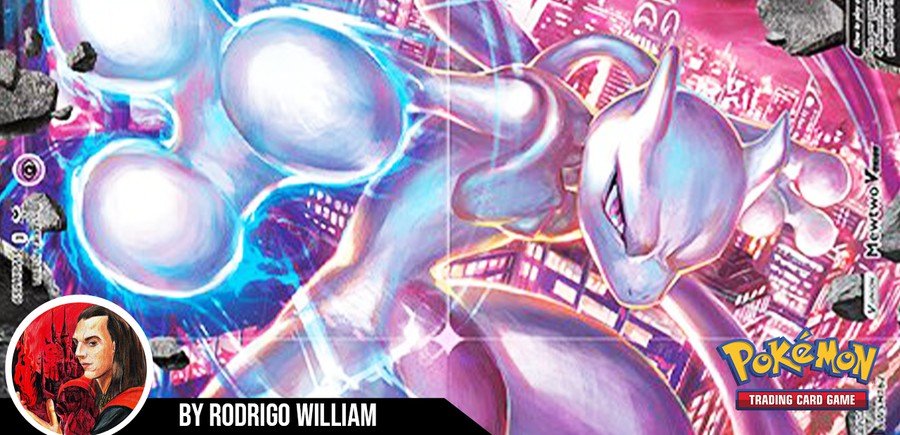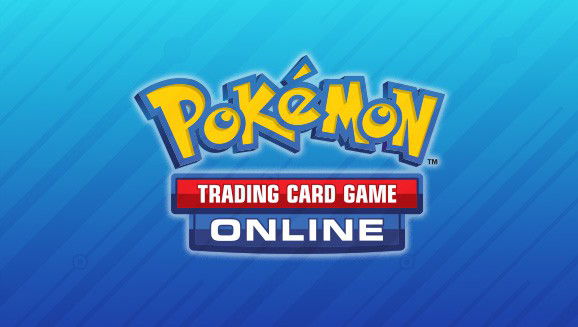Hello everybody. I'm Rodrigo, bringing more deck news for the Standard/Standard format of Pokémon TCG from the Pokémon GO expansion with a cheap and accessible deck for everyone literally: the Lunatone and Solrock deck, being something very simple and as objective as possible for beginners who want to enter the world of TCG.
Without further ado, here's the list and analysis:
Lunatone & Solrock
Deck Analysis
The deck is simple and practically didactic with the synergy system, almost symbiotic between Lunatone and Solrock.
Ad

Your main attacker will always be Lunatone with the attack Moon Kinesis (C)(C)(C), which does 30 base damage plus 30 for each psychic energy attached to it.
Considering a good situation where this Lunatone has 10 energies attached to it, its damage can reach the incredible 300 + 30 of base damage, adding up to a total of 330 and destroying almost all the big game cards of the format, such as Pokémon VMax and VStar (that's because I'm not even including the damage sum with the Choice Belt)!

So, we come in with Solrock, with its Sun Energy ability, which every turn you take, you connect a psychic energy from your discard pile to your Lunatone, accelerating this power-up feature. And as said, Lunatone can deal tons of damage by accumulating energy.
We also have Radiant Greninja ASR 46, which with its Concealed Cards ability, you can discard an energy card from your hand to draw two cards, and discarding a psychic energy, it is possible to make this synergy of:
1) Have Lunatone as an active Pokémon;
2) Play as many Solrock as you can as Benched Pokémon;
3) Play Radiant Greninja and use its ability, discarding this psychic energy;
4) use these Solrock as energizers and attach those energies directly to Lunatone and do its damage.
And then, we enter with the Trainer Item Tool card Choice Belt BRS 135, which deals 30 more damage against V-type Pokémon, being able to knock out the large V-type Pokémon of the format (which is predominant in the block).

For protecting your Solrock from sniper damage like Inteleon V FST 78, Rapid Strike Urshifu VMAX BST 88, Jolteon VMAX EVS 51, Blastoise VMAX PR-SW SWSH103 , we have Manaphy BRS 41 that protects your reserve bench from damage from attacks caused by your opponent thanks to its Wave Velt ability.
Trainer Cards
Now going to the Trainer cards part, analyzing their functions being applied:

- Irida ASR 147 is pretty much the only Supporter-type card in the deck. Its purpose is to get a water Pokémon and a Trainer Item card from your deck and put it in your hand.
So basically, it's for looking for Manaphy BRS 41 to protect your bench, Radiant Greninja ASR 46 for the energy discard and card draw combo, and eventually Pyukumuku FST 77 to use it with its draw ability, Pitch to Pyukumuku, where if you have it in your hand, you can put it back in the deck, but as the last card at the bottom of the deck, and then draw a card (remembering that you cannot repeat this ability in the same turn).
And with Item Card Search as its second effect, you can search for the Choice Belt BRS 135 to equip on your Lunatone and close damage.

- Fog Crystal CRE 140 is precisely to seek psychic energy or a psychic Pokémon of your choice, that is, Lunatone. Simple and straightforward.
Ad
- The card Battle VIP Pass FST 225 is where you can accelerate your turn to at the beginning of the first round, if you are the first to play, look for two basic Pokémon and put it on your bench, already guaranteeing two Solrock to double power up your Lunatone and advance the game.
- Rescue Carrier EVS 154 is for rescuing a KO'd Solrock or a Lunatone, as the card has the effect of recovering Pokémon with 90 HP or less from your discard pile and putting them in your hand, returning to your game cycle.
- Trekking Shoes ASR 156 is for the deck filter where you can discard energies, that is, using its effect that you can look at the top card of the deck and choose to keep that card or discard it. If an energy comes, it's obvious you'll discard it to make Solrock's ability to power Lunatone!

- PokéStop PGO 68 is also interesting to help filter the deck and look for 3 Pokémon at the top of your deck, that is, looking at these three cards. If you don't find these Pokémon, you return these cards to the deck and shuffle them.
However, the opponent does the same. So if you're going to be sure to get more Solrock with this, remember to get the Manaphy BRS 41 beforehand to preserve your bench.
- Of all the Pokéball cards in the deck, I will only mention the importance of Hisuian Heavy Ball ASR 146 because it looks at the prize cards face down to look for a basic Pokémon and from there to be able to acquire it. If successful, you will replace that Pokémon that was caught with the Hisui Heavy Ball card. So if there's the misfortune of a Manaphy BRS 41 or Radiant Greninja ASR 46 being on the prize cards, this Pokéball is your salvation.
- Ordinary Rod SSH 171 is our resource recycling, returning two energy from discards to the deck and two Pokémon as well; and always being able to choose either the energies, or the Pokémon, or perform both (and of course you will rescue both).

- Cross Switcher FST 230 is precisely the "Boss's Orders", but in an Item card version, without being a Supporter, which doesn't make you lose a Supporter card in the turn, taking advantage of some other for strategic reasons. To use Cross Switcher FST 230, you need to have two in your hand to do this effect, pulling an opponent's Benched Pokémon into active position.
- And finally, one of the key cards of the deck, Choice Belt BRS 135, which grants you 30 more damage against Pokémon-V of any type (either V, VMax, VStar, VUnion) in which the Pokémon has it equipped.
Format Archetypes
Advantages
As a practical deck that only has cards that offer a prize card, it doesn't offer many risks to lose the game quickly, as they are with type V cards.
In addition, we have a simplicity of power-up and symbiosis with the other cards, literally following a script, a "script" of how to do things, going from A to Z without any fuss and without beating around the bush, and still being able to cause significant damage from up to 360 damage if a Lunatone has all 11 energies attached to it and a Choice Belt equipped with it, destroying all high HP Pokémon in the current format.
Ad
Disadvantages
As the deck doesn't have many raw energy recycling cards like the Energy Recycler BST 124, if by chance your opponent uses a Boss's Orders RCL 154 and pulls your energy-filled Lunatone (assuming, with 10 energies on), it's pretty much the end of your game.
Or if, by chance, the opponent manages to do "spread" damage, that is, spread direct damage to your Benched Pokémon to destroy your Solrock and a potential new attacker like a second Lunatone and not have guaranteed the Manaphy BRS 41, they also end your game. And to make matters worse, combats against Pokémon that use massive damage counters like Mewtwo V-Union, which uses 16 damage counters that they can redistribute among your Pokémon, circumventing the defense effect of your Manaphy BRS 41, it's also pretty much the end of your deck.
Conclusions
It's an objective deck, very simple and didactic and anyone can use it (literally), and best of all: cheap!
Good for beginners who have just started buying Pokémon GO cards and want to get to know the game, this deck is useful to get started.
But of course, don't expect it to be an International or World champion deck because even though it's strong with high destructive power, it takes plenty of risks and doesn't have much security of resource recycling, being an 8/80 overflow deck: if it hit the combo, it hits and follows the script. However, if the opponent breaks the legs of your strategy, your deck literally crashes and there is nothing you can do, if the disadvantages I mentioned above arise.










— コメント0
最初にコメントする